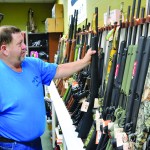Local gun shops not giving up on Remington — Lincoln County gun dealers believe Big Green got itself in trouble, will eventually get itself out
Published 8:14 pm Wednesday, February 28, 2018


I like Remington.
I know, that is a controversial stance to take among gun enthusiasts today. It will get you chased right off the Internet. A man in a white hardhat will come unplug your service and hand you a Savage rifle.
I made that up.
Trending
But folks really are upset with Remington these days. In the business world, those folks are called “consumers,” and their 10-year exodus from beneath the Big Green roof finally caused the house to fall in Feb. 12, when Remington Outdoor Co. announced it had filed for Chapter 11 bankruptcy to hide from nearly $1 billion in debt.
None of us gun-lovers were surprised by this. The writing has been on the ammo box for Remington for several years now. But from where I stand, the eulogy reads a little different from what national media have been saying about the company for the last few weeks.
Google it, and read a dozen articles on the bankruptcy all citing the same reasons — declining gun sales in the post-Hillary “Trump slump,” and investor fright at Remington’s parent company, Cerberus Capital Management, after it was discovered a Remington-made weapon was used in the Sandy Hook school shooting in 2012. There have also been widespread reports of unsafe triggers on the Model 7 and 700, with lawsuits leading to a recall on eight years’ worth of guns.
Those are legitimate reasons. Remington reported a $28 million loss in 2017 after the wave of Hillary-induced panic buying finally crashed on the shore of red relief, and shareholders urged Cerberus to shed the company after Sandy Hook. But every firearms manufacturer is in the midst of a slump — 2016 set sales records that may stand forever — and the hell dog investment firm never sold (but they did change the name from hated Freedom Group back to Remington in 2015).
Something is missing from these analyses. Bloomberg, Washington Post and all those other writers smarter than me are ignoring what we who are passionately involved in firearms have know for a decade.
Buyers bailed on Remington because they made junk.
Trending
“The high-end stuff is still awesome — CDLs and nice 1100s, Wingmasters — but their low-end stuff is terrible right now,” said Ryan Strange, manager of 51 Pawn and Gun in Bogue Chitto. “They put that powder coat finish on them, and they ain’t worth a damn.”
Now, we are getting down to the gospel.
Ever since Cerberus bought Remington and a handful of other firearms-related companies in 2007, the quality of the guns has suffered. There are countless testimonials of new rifles rusting on store shelves, burs in the metal from poor machining, gritty actions, bad fit — and that is only on the good guns. Other products, like the R-51 pistol, went over like mud on your momma’s carpet.
That means it did not work.
“The low-end stuff is the most competitive market there is right now, and Remington is getting beat bad in that market,” Strange said. “The Savage Axis, Ruger American and Remington’s 783 — the bottom line is a 783 is not comparable to a Ruger American. Who can blame a man? A novice deer hunter is going to hunt five or six times a year. He can pick up a Ruger American, slap a $125 scope on it and, for $500, have a really good-shooting gun.”
Strange, and many others, speculate the demise in Remington’s quality was not a mistake, but a business decision.
Cerberus specializes in “distressed investing,” which means they buy companies in rough patches to flip them to success (they bit the bullet trying it with Chrysler a decade ago, ending up with a $4 billion injection from the taxpayers).
A more informal definition of distressed investing is buying companies in rough patches to squeeze out every drop of profitability before dumping the crushed carcass. Popular gun website The Truth About Guns claims Remington was “saddled” with debt by Cerberus. When Cerberus bought Remington in 2007, it assumed $250 million in debt — one-quarter of what Big Green owes today.
In other words, Strange said, Remington may have been slain on purpose.
“At some point in time, the reason they’re going bankrupt is simply because it’s easier to file Chapter 11 and take a loss than to pay taxes,” he said. “That’s the story with Remington. That’s the way business works, right? They’ll stay in bankruptcy for the mandatory amount of time, come back with a few different letters on the end of the name, then manufacture the same stuff.”
Bad manufacturing decisions and unsteady financial leadership are not the only mistakes Remington appears to have made.
Jason Martin-Nez, owner of 601 Sports in Brookhaven and Vicksburg, said local gun stores fired shots at Remington for the last two years after the company pulled out of distribution agreements with independent dealers, favoring big box stores and other distribution channels instead.
In response, 601 Sports and other privately-owned gun shops — there are more than 60,000 nationwide — introduced lesser-known European brands competing at the same price point with rifles that mostly copy the 56-year-old Remington 700 design.
Americans got a taste of excellent rifles made by companies like Tikka (a Finnish company, owned by Sako, that once made respectable sewing machines) and Bergara (a Spanish company that makes superb rifle barrels and, now, superb rifles).
A sales associate at Van’s Sporting Goods in Brandon told me in January the huge store sold 175 Bergara rifles in 2017, and “six or seven” Remington 700s.
“Don’t buy one of them anymore,” he told me as I looked over the 700s. “They just ain’t as good of rifles.”
Apparently, Remington got the message. Martin-Nez said Remington has resumed business with independent distributors, and 601 Sports will offer more Remington firearms than ever before in 2018, bankruptcy notwithstanding.
“They just came back in the fold, and they’ve got some pretty good deals for us on ammo and probably some exclusives for guns you can’t find anywhere else, a little price break to help us compete with the bigger stores,” he said. “You’ll see a lot more Remington in this store this year. It’s kind of the opposite of doom and gloom. For us, Remington is not going away.”
Martin-Nez said new Remington CEO Anthony Acitelli, who was elected by the company’s board last October, directed Remington’s return to the small-store table.
It’s a smart move by Big Green, and so is hiring Acitelli — the former CEO of Taurus — after a procession of company chiefs over the years who, although really smart guys, were basically Cerberus soldiers with no experience in the firearms industry (including Robert Nardelli, who quit Chrysler the day after it filed for bankruptcy).
“I’ve been doing this long enough to know, it goes in waves with a lot of guns. You see it every once and awhile from different manufacturers,” Martin-Nez said. “Maybe they’ve made a bad run or had some bad years. Maybe they cut back on certain products, or tried to make guns too quickly. They’ll have issues for a year or two that might not meet certain standards, then they’ll get it corrected.”
How Remington gets those issues corrected remains to be seen. Bloomberg reported on Feb. 26 the creditors taking possession of the company under the bankruptcy agreement intend to immediately shop for buyers. Potential corporate buyers have already expressed some interest in acquiring Big Green, according to the story.
Perhaps Remington will be bought up by another, stronger firearms manufacturer that will focus on refining the core products and keeping the brand viable.
Winchester — the company that won the west — changed names, went bankrupt in 1989 and was sold to Herstal Group, which owns firearms manufacturers FN and Browning. Those fine weapons — including the Winchester 70, the “rifleman’s rifle” — are now made in Belgium.
It would be a hollering shame if a company that has produced American-made firearms since 1816 had to ship rifles over from Europe on container ships, but I guess that’s better than losing Remington altogether.
It is important to remember Remington is not the first gun company to see sad faces at the bank. Colt filed for bankruptcy in 2015, Savage in 1988. There are others.
Strange and Martin-Nez said their stores will continue to sell and service Remington products. So will The Bullet Hole in Brookhaven, where owner Richard Goss believes strongly in Remington and shakes his head at bad talk.
“You’re going to find pros and cons out there everywhere, but the Remington 700 is one of the best-shooting rifles there is,” he said. “I still sell a bunch of them, and I will keep ordering them as long as I can get them.”






